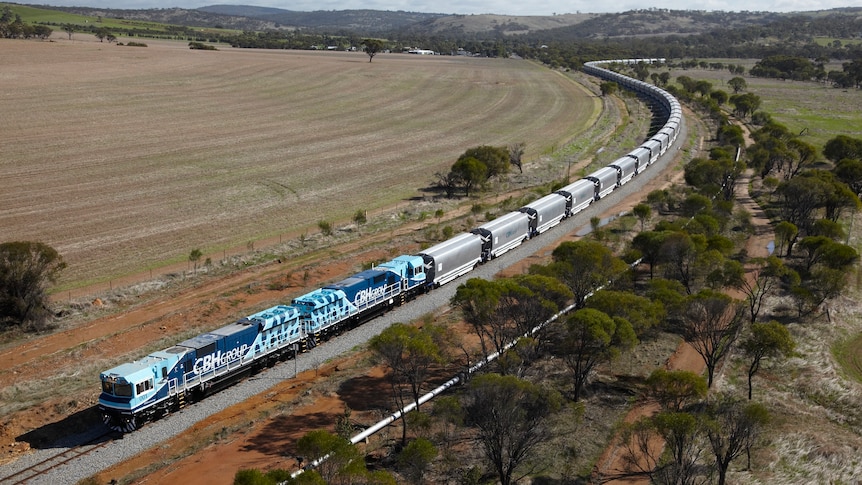Western Australia’s main grain handler will make its biggest purchase of trains as the co-op grapples with increasing farm productivity.
Co-operative Bulk Handling (CBH) has signed contracts to spend more than $400 million on new locomotives and wagons in order to meet transport targets by 2033.
Chief executive Ben Macnamara said the combined investments were one of the co-op’s most significant in terms of money and capacity.
“This acquisition of rolling stock essentially sees us doubling our fleet size,” Mr Macnamara said.
The new shopping list includes 17 narrow gauge diesel-electric locomotives to be purchased from US company Wabtec, as well as 200 standard gauge and 450 narrow gauge grain hopper wagons to be made by Chinese company CRRC Meishan.
The agreements are in addition to an order to purchase seven standard gauge locomotives from Progress Rail, made in December.
Record harvests help pay for purchase
Mr Macnamara said the purchase would be paid for by the organisation’s balance sheet and grower freight rates.
Record grain harvests and strong grain prices in recent years resulted in CBH achieving its largest annual profit of $497 million last year.
Large harvests and logistical challenges also resulted in the CBH system holding carryover grain in consecutive seasons and paying millions of dollars of demurrage fees for delays to ship loading.
The cooperative accepted more than 21 million tonnes of grain last season, the largest crop in its 90-year history, but that figure is expected to be less than average in the future.
“As we forecast out to 2033, we think we’ve got an average task around 22 million tonnes,” Mr Macnamara said.
“We could see peaks of up to 30 million.
“This is about making sure that we’ve got an efficient and effective supply chain that can handle the growing tasks.”
Productivity gains expected
The purchases are the first significant rail fleet investment CBH has made since acquiring 25 locomotives and 572 wagons for $175 million in 2012.
At the time the average Western Australian crop was 10 million tonnes of grain annually.
The new investment makes sense to Episode Three Grain analyst Andrew Whitelaw.
“Over the next 10 years we’re going to see productivity gains, because we always do see productivity gains in genetics, in farming practices,” Mr Whitelaw said.
“Also, in all likelihood, we’re going to see a reduction in sheep numbers in Western Australia with the phase-out of live sheep exports.
“If we look back in history, as sheep numbers drop cropping acres go up, and so that could be another couple of million tonnes, just enough from sheep numbers declining.”
The first new purchases, five locomotives, are expected to arrive in March 2026.
Source : ABC News

